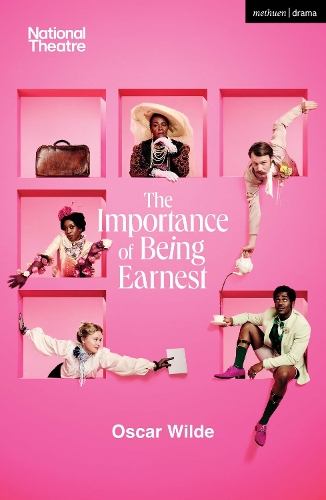
The Importance of Being Earnest
(Paperback)
Available Formats
Paperback
Published: 1st February 2000
Paperback, 2nd edition
Published: 7th April 2022
Paperback
Published: 6th February 2025
Hardback
Published: 24th February 2021
Hardback
Published: 23rd March 2017
Paperback
Published: 19th September 2016
Paperback, Enriched Classic
Published: 1st October 2005
Paperback
Published: 19th March 2012
Paperback
Published: 1st December 2004
Publishing Details
The Importance of Being Earnest
By (Author) Oscar Wilde
Bloomsbury Publishing PLC
Methuen Drama
6th February 2025
United Kingdom
Classifications
General
Non Fiction
Comedic plays
428.6
Physical Properties
Paperback
88
Width 126mm, Height 196mm, Spine 10mm
106g
Description
A Trivial Comedy for Serious People
Being sensible can be excessively boring. At least Jack thinks so.
While assuming the role of dutiful guardian in the country, he lets loose in town under a false identity. Meanwhile, his friend Algy takes on a similar facade.
Unfortunately, living a double life has its drawbacks, especially when it comes to love. Hoping to impress two eligible ladies, the gentlemen find themselves caught in a web of lies they must carefully navigate.
A new edition of Oscar Wilde's legendary comedy, published to coincide with the revival at London's National Theatre, in November 2024.
Author Bio
Oscar Fingal O'Flahertie Wills Wilde (b. Dublin, 1854) was an Irish playwright, who wrote one of the best loved comedies in the English language - The Importance of Being Earnest (1895). A leading wit and conversationalist in London society, his career was destroyed at its height when he was imprisoned for homosexual offences.
Wilde was born in Dublin and educated at Trinity College, Dublin, and Magdalen College, Oxford. Settling in London, he became famous for his extravagant dress, long hair, and paradoxical views on art, literature, and morality. His first play, Vera (1880), a tragedy about Russian nihilists, was produced in New York to poor reviews. Success in the theatre came with the elegant drawing-room comedy Lady Windermere's Fan. A Woman of No Importance (1893) was another success. Other works for the theatre were An Ideal Husband (1895) and the biblical Salom (1896), written in French for Sarah Bernhardt. Wilde flaunted his homosexual affairs, including his ill-fated liaison with Lord Alfred Douglas. Following a celebrated trial in 1895 he was sentenced to two years' imprisonment with hard labour. The sentence led to public humiliation, poor health, and bankruptcy. On his release in 1897 he left for France and remained in exile there until his death in 1900.
